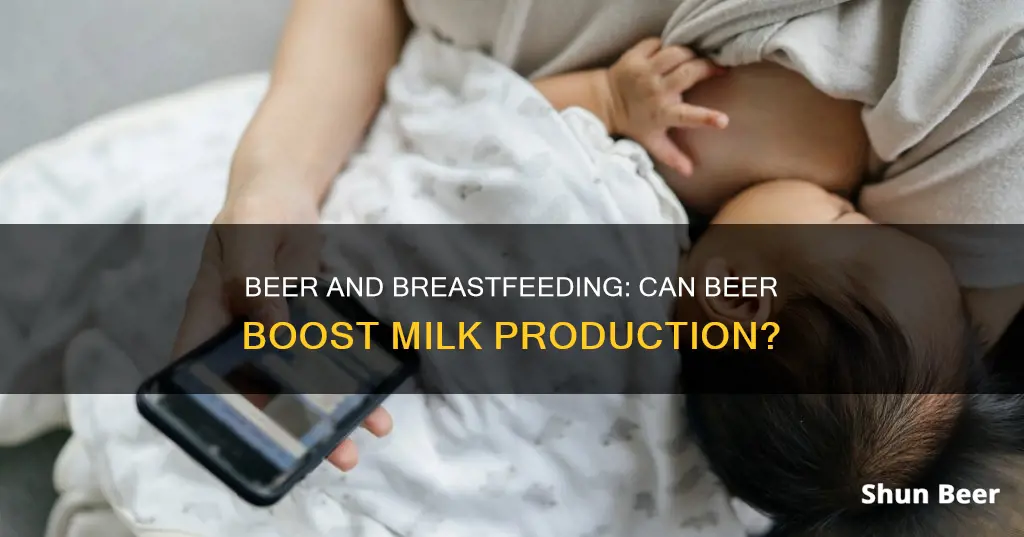
There is a long-standing belief that drinking beer can increase milk supply in breastfeeding mothers. While there is some evidence that the polysaccharide carbohydrates found in beer, such as barley and hops, can increase milk production, these are also found in non-alcoholic beer. It is important to note that alcohol passes directly from parent to baby through breast milk and may decrease milk production due to its effects on the hormone oxytocin. Therefore, while an occasional standard-sized drink is not harmful to the baby, breastfeeding mothers are advised to avoid alcohol, and there are safer alternatives to beer for increasing milk supply.
| Characteristics | Values |
|---|---|
| Effect on milk supply | There is some evidence that the polysaccharide carbohydrates found in beer, such as barley and hops, do increase milk production. However, there is also evidence that alcohol can decrease milk production and slow the flow of milk. |
| Occasional drinking | The CDC recommends waiting a minimum of two hours after drinking before breastfeeding. |
| Regular drinking | Chronic alcohol use is associated with early weaning and can affect the baby's sleeping schedule. |
| Alcohol-free beer | Alcohol-free beers may provide extra calories, which may be helpful for mothers who are having trouble maintaining weight or accessing nutritious foods. |
What You'll Learn

Barley in beer increases prolactin, the milk-making hormone
It is a widely held belief that drinking beer can increase a mother's milk supply. This notion has been around for centuries, with some cultures swearing by it. In fact, in the late 19th century, a US brewery produced a low-alcoholic beer called Malt Nutrine, which was prescribed by doctors to pregnant and lactating women.
While there is no hard evidence to support this claim, there are some studies that suggest that beer can stimulate the secretion of prolactin, the hormone responsible for milk production. However, it is important to note that these studies were conducted on non-lactating individuals, and the link between increased prolactin levels and milk supply remains inconclusive.
So, what is it about beer that might affect prolactin levels? Well, it's not the alcohol—studies have shown that the rise in prolactin levels is caused by a polysaccharide found in barley, one of the main ingredients in beer. This means that non-alcoholic beer can also induce the same effect.
It is worth noting that while some sources suggest that brewer's yeast is the key ingredient in beer that increases prolactin levels, others refute this claim, stating that it is indeed the barley.
In conclusion, while there may be a link between barley in beer and increased prolactin levels, there is currently no solid evidence to suggest that drinking beer will increase milk supply. More research is needed to establish a direct causal relationship.
Beer and Yeast Infections: Is It Safe to Drink?
You may want to see also

Non-alcoholic beer can increase milk supply
It is a widely held belief that drinking beer can increase a person's milk supply. However, there is little scientific evidence to support this claim. While it is true that beer can increase levels of prolactin, the hormone responsible for milk production, these studies were conducted on non-lactating individuals, and the effect is attributed to the barley in beer rather than its alcohol content. In fact, alcohol may actually hinder milk production by impacting the hormone oxytocin. Therefore, it is generally recommended to avoid regular alcoholic drinks during lactation and instead suggest non-alcoholic alternatives.
The benefits of non-alcoholic beer for breastfeeding
Non-alcoholic beer has been found to have several benefits for breastfeeding individuals. Firstly, it can stimulate prolactin secretion, enhancing milk production, due to the presence of a polysaccharide derived from barley. This means that individuals who are struggling with their milk supply may find non-alcoholic beer to be a helpful solution. Additionally, non-alcoholic beer has been shown to increase the antioxidant properties of breast milk and reduce oxidative damage in breastfeeding individuals, promoting overall health and well-being.
Recommendations for alcohol consumption while breastfeeding
While non-alcoholic beer can be a safe and effective way to boost milk supply, it is important to follow guidelines regarding alcohol consumption while breastfeeding. Alcohol passes directly from the parent to the baby through breast milk, and it may reduce the baby's milk intake. Health Canada and the CDC in the US recommend waiting for at least two hours per alcoholic drink before feeding or expressing milk for an infant. It is also important to note that pumping and dumping do not eliminate alcohol from milk faster than the body's natural removal process.
Alternative methods to increase milk supply
Although non-alcoholic beer can be beneficial, there are other effective and safe methods to increase milk supply. Lactation cookies, for example, are designed with a specific balance of milk-increasing ingredients, protein, carbohydrates, and fat, which signal to the body to produce more milk. Carrying a manual breast pump and increasing the frequency of feeds and pumping sessions can also help stimulate milk production. These methods provide a safer and more reliable way to address any concerns about milk supply without resorting to alcohol-containing beverages.
Keto and Diet Root Beer: Is It Allowed?
You may want to see also

Alcohol in beer inhibits the milk-ejection reflex
Alcohol inhibits the release of oxytocin, the hormone responsible for the milk ejection reflex. This can result in delays in milk letdown, with higher doses of alcohol leading to longer delays.
Research has shown that nursing infants consumed less milk in the three-to-four-hour period after mothers consumed a small to moderate amount of alcohol. This was the case even though the infants nursed for a similar amount of time as they did when they were not exposed to alcohol in their mother's milk.
According to a study by Menella, infants consumed approximately 20% less breast milk during the first four hours after alcohol consumption, despite similar nursing times. Similarly, another study by Mennella and Beauchamp showed that infants consumed about 23% less milk.
The combination of alcohol's effect on the hormones oxytocin and prolactin leads to a significant delay in milk ejection. The lower the level of oxytocin, the longer the delay in the ejection of milk. The higher the level of prolactin, the longer the delay.
Overall, infants consume about 20% less milk during the immediate hours after maternal alcohol consumption, likely due to diminished milk production.
Beer and Vitamins: Can They Mix?
You may want to see also

Lactogenic ingredients in beer can help with milk supply
First, hops acts as a sedative, calming the nerves and aiding with the let-down reflex. Hops is also an estrogenic herb and a sedating galactagogue with a strong reputation for aiding the milk ejection reflex. Yeast, the second ingredient, contains beta-glucan and is often used as a galactagogue. Beta-glucan is a type of starch that has many medicinal properties, including balancing blood sugar, feeding good gut bacteria, improving digestion, and enhancing immune function. Studies on animals show that beta-glucan increases milk production and the milk-making hormone, prolactin.
The third ingredient, water, is essential for hydration, which is key to maintaining a good milk supply. Finally, barley grain and barley malt, which also contain beta-glucan, are known to increase prolactin, the hormone responsible for milk production.
While these ingredients in beer can potentially support lactation, it is important to note that alcohol itself inhibits the milk ejection reflex and can negatively impact the baby's sleeping schedule. Chronic alcohol use is associated with early weaning, and alcohol passes directly from parent to baby through breast milk. Therefore, non-alcoholic beers are generally recommended for breastfeeding mothers.
Beer and Finasteride: Is It Safe to Drink Alcohol?
You may want to see also

The safety of alcohol consumption while breastfeeding is debated
The safety of alcohol consumption while breastfeeding is hotly debated. It is well-known that alcohol passes freely and quickly from the bloodstream into breast milk. As such, the general consensus is that it is best to abstain from drinking alcohol while breastfeeding. However, some sources state that drinking in moderation—defined as up to one standard drink per day—is acceptable.
The American Academy of Pediatrics, the World Health Organization, and the Centers for Disease Control and Prevention (CDC) all recommend that breastfeeding mothers abstain from drinking alcohol. The CDC further states that "not drinking alcohol is the safest option for breastfeeding mothers". However, they also note that moderate alcohol consumption (up to one drink per day) is not known to be harmful to the infant. The CDC recommends waiting at least two hours after drinking before nursing or expressing milk.
On the other hand, some sources claim that there is insufficient proof that drinking alcohol while breastfeeding is entirely safe. Excessive alcohol consumption can interfere with the milk ejection reflex and lead to decreased milk production over time. It can also negatively impact an infant's development, growth, and sleep patterns. Additionally, some infants may dislike the taste of alcohol in breast milk, which can result in reduced milk intake and associated risks.
It is worth noting that the effects of long-term exposure to alcohol through breast milk are not yet fully understood. While some studies suggest that moderate alcohol consumption may not have harmful effects on infants, others indicate potential long-term consequences on brain development and cognitive abilities.
Ultimately, the decision to consume alcohol while breastfeeding is a personal one, and mothers should carefully weigh the available information and recommendations from trusted sources before making an informed choice.
Beer and Periods: Is It Safe to Drink?
You may want to see also
Frequently asked questions
The overall safety of drinking alcohol while breastfeeding has long been debated. It is known that alcohol passes directly from parent to baby through breast milk, and it may decrease milk production due to its effects on the hormone oxytocin. The CDC in the US recommends waiting two hours after your last alcoholic drink to nurse or express milk for an infant.
There is some evidence that the polysaccharide carbohydrates found in beer, such as barley and hops, do increase milk production. However, these are also found in non-alcoholic beer.
Other plant products like fenugreek, Coleus amboinicus Lour (Mexican mint), or palm dates do, in fact, appear to increase milk production. Lactation cookies are another alternative, which are made with a unique balance of milk-increasing ingredients, protein, carbs, and fat that signal to the body it's time to make milk.
Increasing the frequency of feeds and pumping sessions is usually enough to tell your body to increase milk production.







